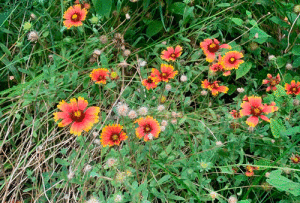
Firewheel (Gaillardia pulchella) is native to Brazoria county and an important nectar source for a variety of butterflies.
Photo by Celeste Silling.
Our entire ecosystem is reliant on native plants. They provide clean air and shade. Insects, birds, and other wildlife rely on them for food and shelter. For example, native flowers provide nectar and pollen that insects need to eat to survive while trees and shrubs provide shelter for bird nests. Native plants host native insects, which are then eaten by native birds, and so on. These plants are an integral part of life.
Unfortunately, the majority of plants at commercial nurseries are exotic species that cannot support wildlife like native species can. With urbanization, many of our native plants have been dug up and replaced with buildings, roads, and decorative non-native plants. These massive habitat losses have left the remaining wildlife struggling to survive on limited land and resources. Of course, this puts the pressure on homeowners and landscapers to make the best of what little land we have left and plant native plants to support native wildlife.
The right plants can bring a variety of life to your yard from butterflies and moths to warblers and hummingbirds. Animals are naturally more drawn to these plants than they are to bird feeders or houses. It’s important to plant plants of different shapes and sizes. Planting a variety of species can support a variety of wildlife and also make for a scenic yard. For example, sparrows prefer thickets and tall grasses while Northern Cardinals prefer dense shrubby areas and woodpeckers need trees.
Besides supporting insects, birds, and other wildlife, there are many other benefits to planting native plants. For one thing, they tend to need far less maintenance than exotic plants from other different areas. Native plants are naturally adapted to the specific soil, moisture, and heat conditions of the area, so they won’t need to be doted over. You won’t need any expensive fertilizers, because they are meant to grow in local soil and they can also help you conserve water and save money on your water bill. Plus, these plants tend to need far fewer pesticides, as they’ve already adapted to local insects and pests.
There are many resources that you can use to find which plant species are native and beneficial to your area. Audubon, for example, has a database of native plants by zip code. Or you can go to a local native plant nursery and see what they have to offer. If you are in the Lake Jackson area, you can shop at GCBO’s online native plant nursery, where we have a selection of bird-friendly plants. We will be having a 10% off sale on all plants for our Xtreme Hummingbird Xtravaganza (9/19-9/27). Go to our website www.gcbo.org to learn more about the event and get some native plants for your garden. And remember, plant native!
